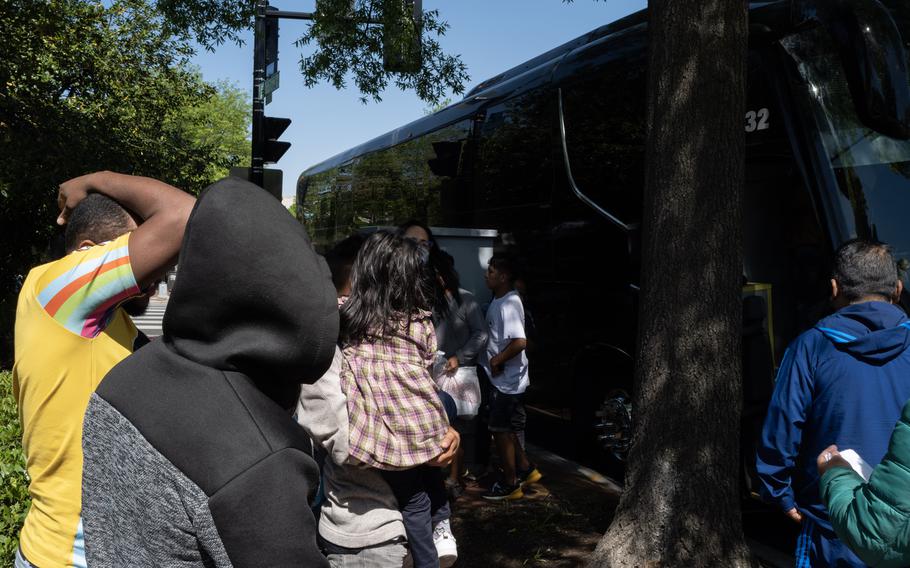
Migrants gather in D.C. after arriving on a bus from Arizona on April 18. (Michael Robinson Chávez/The Washington Post)
D.C. Mayor Muriel E. Bowser’s (D) administration this week opened a new respite center for U.S. asylum seekers arriving on buses from Texas and Arizona, adding a second clearinghouse in the region for those individuals amid expectations that more will come over the next few months.
The new site, located at the Salvation Army building on New York Avenue NE, has so far received migrants from two buses. Aid workers there offered preliminary services before the migrants left for other locations, according to migrant advocates who’ve met with those who’ve arrived.
The four-story brick building that has been used as a treatment center for people with addictions will function similarly to another respite center in Montgomery County — offering as many as seven nights of lodging, food, case management and support with plans to move elsewhere, according to D.C. Council member Charles Allen (D-Ward 6), whose office on Thursday posted an announcement about the building in the ward next to his.
The city, which has been searching for a site large enough to process newly arrived migrants, opened the facility on Monday without a public announcement.
Spokespeople for Bowser’s office and the city’s Department of Human Services, which oversees the Office of Migrant Services, which was created last fall, did not respond Friday to requests for comment about the facility. A Salvation Army spokesperson also did not respond to a request for comment.
After a brief lull in border crossings earlier this year, concerns about migrants arriving to the Washington region have again heightened after the Biden administration ended the pandemic-era Title 42 policy that kept many of those individuals in Mexico while they awaited admission into the United States.
Texas, which had stopped sending buses to D.C. in January, resumed those trips after the Title 42 policy ended last month, while Arizona sends about three buses per week, a spokesperson for SAMU First Response, the nonprofit that has become the primary contact for newly arrived migrants, has said previously.
So far, more than 180 buses have arrived to the city since Texas and Arizona launched their busing programs in spring of 2022, a form of protest by the Republican governors of those states over the Biden administration’s border policies.
Earlier this week, Virginia Gov. Glenn Youngkin (R) announced he is deploying 100 National Guard troops to the Texas border, heeding a call from Gov. Greg Abbott (R) for more support from states over border crossings, which Republicans argue has allowed illegal batches of fentanyl to enter the country.
“The ongoing border crisis facing our nation has turned every state into a border state,” Youngkin said in a news release.
Migrant advocates in D.C. said the city’s new respite center does not address the broader problems related to the continuing influx of U.S. asylum seekers — particularly a lack of permanent housing as many now arrive to the District by plane, car or commuter bus from other states.
Last month, the Office of Migrant Services stopped accepting newcomers to the three New York Avenue hotels the city has been using to temporarily house 1,250 migrants, some who’ve been there since last summer amid sputtering efforts to find long-term housing in one of the country’s priciest housing markets.
The city’s Department of Human Services, which expects the cost of migrant services to reach $52.5 million by October, has not said when it expects to reopen those hotels to new families.
Though the D.C. Council recently passed legislation requiring Bowser’s administration to increase its resettlement efforts, migrant advocates said concerns that the hotel closures would leave newcomers sleeping in the streets have partly come to fruition.
Some of the newly arrived migrants have been sleeping inside cars parked outside the hotels, said Madhvi Bahl, a core organizer with the Migrant Solidarity Mutual Aid Network, a coalition of groups that has pushed Bowser for more long-term services.
“It’s not really solving the problem,” Bahl said about the Salvation Army building. “All the families that continue to come still don’t have shelter. Buses are still coming in. We are doing our best to help people with housing.”
Rachel Landers Vaagenes, solo pastor of the Capitol Hill Presbyterian Church, said one family who was put up for three days at the new respite center is now sleeping inside her church basement after being unable to get additional help from the city.
“It’s really frustrating,” Landers Vaagenes said. “I had two or three people come to my door last week. I can’t take everybody.”